Related Research Articles
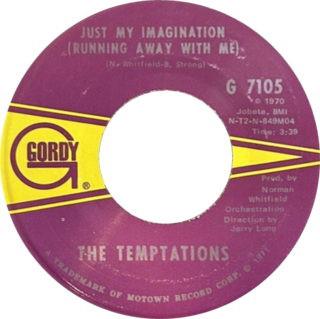
"Just My Imagination (Running Away with Me)" is a song by American soul group the Temptations, written by Norman Whitfield and Barrett Strong. Released on the Gordy (Motown) label, and produced by Norman Whitfield, it features on the group's 1971 album, Sky's the Limit. When released as a single, "Just My Imagination" became the third Temptations song to reach number one on the US Billboard Hot 100. The single held the number one position on the Billboard Pop Singles Chart for two weeks in 1971, from March 28 to April 10. "Just My Imagination" also held the number one spot on the Billboard R&B Singles chart for three weeks, from February 27 to March 20 of that year.

Otis Blue/Otis Redding Sings Soul is the third studio album by American soul singer and songwriter Otis Redding. It was first released on September 15, 1965, as an LP record through the Stax Records subsidiary label Volt.
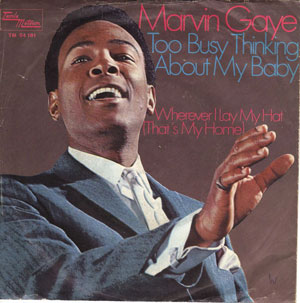
"Too Busy Thinking About My Baby" is a Motown song written by Norman Whitfield, Barrett Strong, and Janie Bradford. The song was first recorded by The Temptations as a track on their 1966 album Gettin' Ready. Eddie Kendricks sings lead on the recording, which was produced by Whitfield. Jimmy Ruffin also recorded a version with The Temptations providing background vocals in 1966. It remained unreleased until 1997.
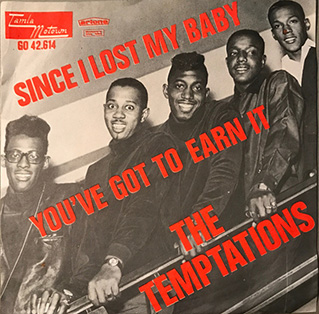
"Since I Lost My Baby" is a 1965 hit single recorded by the Temptations for the Motown Records' Gordy label. Written by the Miracles' members Smokey Robinson and Pete Moore and produced by Robinson, the song was a top 20 pop single on the Billboard Hot 100 in the United States, on which it peaked at number 17. On Billboard's R&B singles chart, "Since I Lost My Baby" peaked at number four.
"Pledging My Love" is a blues ballad. It was written by Ferdinand Washington and Don Robey and published in 1954.
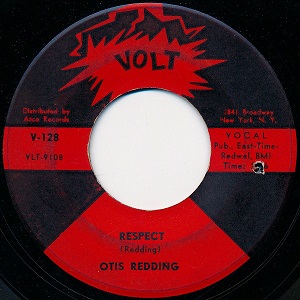
"Respect" is a song written and originally recorded by American soul singer Otis Redding. It was released in 1965 as a single from his third album Otis Blue/Otis Redding Sings Soul and became a crossover hit for Redding.

"Knock on Wood" is a 1966 song by Eddie Floyd and written by Floyd and Steve Cropper. The song was later covered by other artists, most notably Amii Stewart in 1979. Stewart's disco version was the most successful on weekly music charts.

"Strawberry Letter 23" is a song written and composed by Shuggie Otis from his 1971 album Freedom Flight. It is also widely known by the 1977 cover version recorded by the Brothers Johnson and produced by Quincy Jones.

The Great Otis Redding Sings Soul Ballads, simply referred to as Soul Ballads or Sings Soul Ballads, is the second studio album by American soul singer-songwriter Otis Redding, released in 1965. The album was one of the first issued by Volt Records, a sub-label of Stax Records, and Redding's first on the new label. Like Redding's debut Pain in My Heart (1964), Soul Ballads features both soul classics and originals written by Redding and other Stax Records recording artists. The recording sessions took place at the Stax studios in Memphis. The album features a stereo mix made by engineer Tom Dowd, replacing the early mono mix.

"I've Been Loving You Too Long" (originally "I've Been Loving You Too Long (To Stop Now)") is a soul music ballad written by Otis Redding and Jerry Butler. Considered by music critics and writers to be one of Redding's finest performances and a soul classic, it is a slow, emotional piece with Redding's pleading vocals backed by producer Steve Cropper's arpeggiated guitar parts and a horn section.
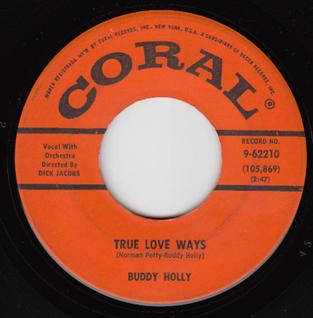
"True Love Ways" is a song attributed to Norman Petty and Buddy Holly. Buddy Holly's original was recorded with the Dick Jacobs Orchestra in October 1958, four months before the singer's death. It was first released on the posthumous album The Buddy Holly Story, Vol. 2, in March 1960. The song was first released as a single in Britain in May 1960, reaching number 25 on the UK Singles Chart. It was released the following month in the US, but did not make the charts. In 1988, a UK re-release of the recording by MCA, the single reached no. 65 on the UK singles chart in a five-week chart run.
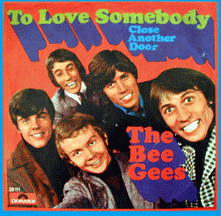
"To Love Somebody" is a song written by Barry and Robin Gibb. Produced by Robert Stigwood, it was the second single released by the Bee Gees from their international debut album, Bee Gees 1st, in 1967. The single reached No. 17 in the United States and No. 41 in the United Kingdom. The song's B-side was "Close Another Door". The single was reissued in 1980 on RSO Records with "How Can You Mend a Broken Heart" as its flipside. The song ranked at number 94 on NME magazine's "100 Best Tracks of the Sixties". The entry was a minor hit in France but reached the top 10 in Canada.
"That's How Strong My Love Is" is a song written by Roosevelt Jamison and first recorded in 1964 by deep soul singer O. V. Wright.

"You Don't Miss Your Water" is a soul song and the debut single written and recorded by American singer William Bell. It was released by Stax Records in 1961. It is Bell's signature song and best known recording.
"It's Growing" is a 1965 hit single by The Temptations for the Gordy (Motown) label. Written by Miracles members Smokey Robinson and Pete Moore and produced by Robinson, the song was a top 20 pop single on the Billboard Hot 100 in the United States, on which it peaked at number 18. On Billboard's R&B singles chart, "It's Growing" peaked at number 3.
"Tramp" is a soul blues song with funk elements, written by West Coast blues artists Lowell Fulson and Jimmy McCracklin. First recorded by Fulson in 1967, it was his highest-charting single since "Reconsider Baby" in 1954. It reached #56 in Canada. The song was covered by Otis Redding in a duet with Carla Thomas, and this version reached No. 2 on Billboard R&B chart.

"Until It's Time for You to Go" is a song from the 1965 album Many a Mile by American singer-songwriter Buffy Sainte-Marie. Sainte-Marie included a French-language reworking of the song, "T'es pas un autre", on her 1967 album Fire & Fleet & Candlelight. French translation was made by Quebecer songwriter Claude Gauthier.
"The Glory of Love" is a song that was written by Billy Hill and recorded in 1936 by Benny Goodman. Goodman's version was a number one pop hit. The song has been recorded by many artists. It was the signature theme of the 1967 film Guess Who's Coming to Dinner, performed by nightclub singer Jacqueline Fontaine on camera, as well as over the opening and closing credits. Bette Midler included the song in the film Beaches (1988) and it appears on the soundtrack album.
"For Your Precious Love" is a song written by Arthur Brooks, Richard Brooks and Jerry Butler, and performed by Jerry Butler and The Impressions in 1958. The song was ranked #335 on Rolling Stone magazine's 500 Greatest Songs of All Time in 2010.

Complete & Unbelievable: The Otis Redding Dictionary of Soul, or simply Dictionary of Soul, is the fifth studio album by American soul singer-songwriter Otis Redding and his last solo studio album released before his death. The successful Otis Blue and the following performance at Whisky a Go Go led to his rising fame across the United States. The first side of the album mainly contains cover versions, and the second songs mainly written by Redding.
References
- ↑ Whitburn, Joel (2004). Top R&B/Hip-Hop Singles: 1942-2004. Record Research. p. 629.
- ↑ Buddy Johnson & His Orchestra - "Keeping My Love for You" / "A Woman, a Lover, a Friend" (1958) single at www.45cat.com